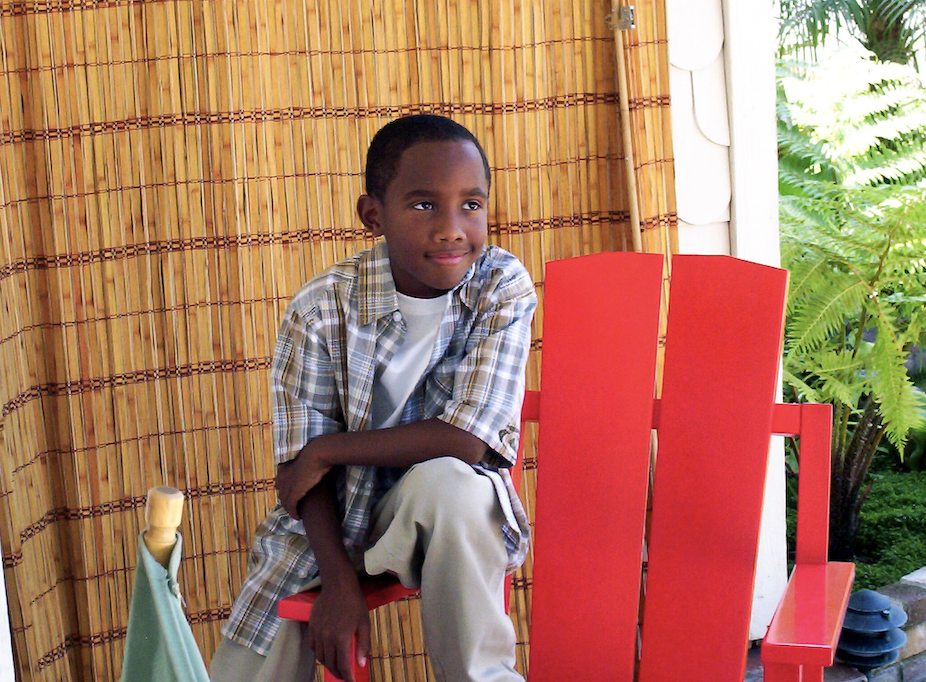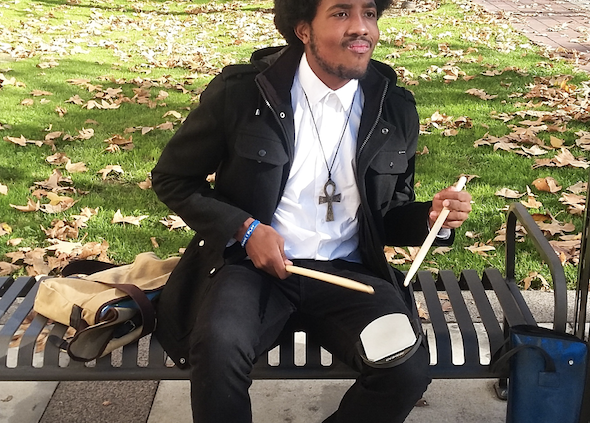To the beat of his own drum: Honoring the life and legacy of Victor McElhaney

On April 13, a group of close friends gathered to celebrate Victor McElhaney’s 22nd birthday. He had planned a lingerie party, with no rules as to how little could be worn. If showing up naked was what made his friends feel liberated, then he was all for it.
They spent the next day the way McElhaney typically spent his Sundays — at Leimert Park participating in a community drum circle with local musicians and dancers. It was a weekend of freedom, self-expression, community and music — exactly how McElhaney would have liked it.
But he wasn’t there.
A month before his birthday, McElhaney, a student in the Thornton School of Music’s jazz studies program, was senselessly shot and killed by four muggers in a liquor store parking lot about a mile and a half off USC’s campus.
According to his mother Lynette, he’d just been trying to go to an art show.

Born with rhythm
From the moment McElhaney could sit up, he was drumming. At three years old, he would only say two words when people asked how he was doing: “I drum.”
Like a pilot flies a plane, a drummer steers a band. They keep everyone on a beat and highlight the individuality of the other musicians. Drummers accentuate the guitar riffs and highlight the horn section rhythm, all while staying in control as the backbone of the band. A drummer’s vitality affects the way everyone plays, and it keeps the musicians in sync.
“He was born a drummer,” said Lynette, an Oakland city councilmember.
Growing up in Oakland, McElhaney specialized in drums, particularly African drums called djembe. But at USC, he played different types of instruments, including the bongo and congas in an Afro-Cuban band.
“There’s a funk element to him, and he was also swinging hard,” Thornton professor Aaron Serfaty said. “He understood the jazz tradition really well. But he was also a hip-hop artist, so he was like a mix of two things.”
Serfaty described McElhaney’s talents as a stew, as a unique blend of elements that complemented each other well.
“He was an amazing musician,” said Syann Cromwell, a close friend and junior majoring in philosophy, politics and law and African American studies and ethnicity. “Rhythm was his essence, was his body. Everything was music.”
McElhaney was also the glue of his family. His mother described him as the bridge-builder, always bringing people together and keeping the family close. As Lynette’s only birth son, he grew up as the youngest of five siblings, raised alongside a half brother from his father’s first marriage and three children who Lynnette and her husband fostered as their own.
“Even though he was the youngest, in many ways he was the big brother,” Lynette said. “[He was] very responsible at an early age and took those responsibilities to heart.”
McElhaney was always comfortable around his multigenerational family, whether it was talking to his great grandfather or playing with his 2-year-old baby cousin. He advocated for his cousins to his aunt and uncle, acting as a liaison when problems between them arose.
“He was the warmth in every circle,” Lynette said.
Creating conversation
But McElhaney’s life skipped a beat on Dec. 20, 2015, when his brother was shot and killed in Oakland. Torian Hughes had just turned 17.
Lynette and her husband fostered Hughes’ mother for one year when she was a teenager, and kept a close relationship with her and her son. When Hughes was in second grade and Victor was in third, Hughes moved in with the McElhaneys for six years.
About four years after he moved out, Hughes was shot in an altercation while trying to buy a gun for protection.
“[Victor] bathed with, laughed with, fought with, cried with, conspired to change the world with [Torian],” Lynette said. “And he was violently taken from our family before he could even reach manhood.”
While grieving the loss of his best friend, McElhaney pondered the conditions of poverty and the importance of mental health. These contemplations were only a small part of his deeper meditation on life’s injustices and how he could challenge them through art.
McElhaney’s passion for people and his investment in their goodness helped him build an inclusive community at USC. Soon after his passing, the University held a memorial at Ronald Tutor Campus Center. By the start of the service, the main ballroom overflowed with students of every race and background, from all corners of USC, coming together for one reason: “Vic.”
“If he saw you for five minutes, he would make that the most impactful five minutes he could with whatever he was doing with his day,” Cromwell said. “Even if he could only give you a hug, it would be the best hug that you had ever gotten.”
One night, Cromwell and McElhaney were bouncing ideas off each other when she mentioned she wanted to do more with Ground Zero Performance Cafe, a performance space on campus where Cromwell is a production manager. Through conversation, they came up with the idea of an art and culture celebration called First Friday. McElhaney encouraged Cromwell to follow through with the concept and give it a shot. The monthly event began this semester at Ground Zero, and it will continue through next semester and beyond, Cromwell said.
“That’s just Vic,” Cromwell said. “His personality was literally to help you. If he saw a potential in you to do something, he would push you to do it. He wanted his people to know that they’re very capable and that he believed in that, and in them.”
As a natural extrovert, McElhaney’s specialty was starting conversations. But he couldn’t just talk about the weather.
“He was very thought-provoking in normal conversation,” said Samuel Reid, a junior majoring in jazz studies and a friend of McElhaney’s. “He wasn’t really down for small talk. Small talk with him would usually get very deep.”
McElhaney was the co-director of Brothers Breaking B.R.E.A.D., a Black Student Assembly organization that welcomes black men into a community to foster black male leadership. He felt comfortable bringing up the big issues that people avoided, such as racism, homophobia and misogyny. He challenged people to give their opinions, but he gave them the opportunity to explain why they felt that way. He wanted to create spaces where people could discuss difficult issues and learn from each other.
Through another brainstorming session with Cromwell, he decided to start showing movies followed by a discussion of its major themes. He organized a screening of “Moonlight” at Ground Zero, at which he fostered an open conversation about identity and breaking down barriers in the first installment of a series called “Keep Me Grounded.” It turned into an event that many students remembered and spoke about at McElhaney’s memorial.
“We definitely plan to continue that event in his legacy,” Cromwell said. “He shaped how those events will happen and will continue to happen. The legacy that he left behind just in that was very important.”
He even turned spaces that weren’t meant for conversation into opportunities to talk about social issues and hear diverse perspectives. During a Latin band rehearsal with Serfaty, McElhaney brought up race relations, and the multi-faceted conversation among his peers lasted for two hours. Not one note was played during that rehearsal — only students expressing their opinions, observations and concerns could be heard.
“He was passionate about it,” Serfaty said. “He was very articulate, very intelligent. And he was intense.”
Leading by example
McElhaney enrolled at USC with the intent of studying afromusicology and the beginnings of both humanity and music. He was passionate about diving into his African roots and understanding the power of drumming vibrations to heal and connect people. He had one goal for his music: to change the world.
For most, that’s a lofty goal that is often viewed as unrealistic. It’s in the back of everyone’s minds as an ideal they’ll never admit for fear of looking naive, looking dumb. But McElhaney said it out loud. He made it known because he knew it was going to happen.
“I always thought he was 35 years old, the way he carried himself and the way he had formulated his approach to life,” Serfaty said.
Serfaty noticed his confidence right away. McElhaney transferred to USC in Fall 2017 from Cal State East Bay with more musical experience than most other freshmen. He was never afraid to do things his way, but he was also aware of his natural leadership during rehearsals. When he started practicing and preparing early, soon enough the whole class followed suit.
“He is going to change the world,” Thornton professor Peter Erskine said. “He’s going to make us all fight for less instruments of violence in our communities, in our cities.”
Gone too soon
When her son was killed, Lynette was in shock.
“The night Victor was killed, I felt like someone had ripped every bone through my body,” Lynette said. “I couldn’t stand.”
Two days later, Lynette called for her son’s shooter to come forward at a news conference in Los Angeles after police told Lynette that they weren’t expecting the killer to turn themselves in. Lynette didn’t believe it or want it to be true.
But more than a month since the shooting, no suspects have been identified and no arrests have been made.
“Come forward,” Lynette said. “Get yourself some help. You need to be arrested until you stop hurting yourself and hurting others.”
She hopes the murderer feels enough remorse and guilt to come forward and seek help. Society never invested in her son’s murderer, she said, and that created a monster.
“And the monster took my baby,” Lynette said.
To make a contribution to the Victor McElhaney Memorial Scholarship, contact the USC Thornton Office of Advancement by emailing [email protected] or calling 213.740.6474.

